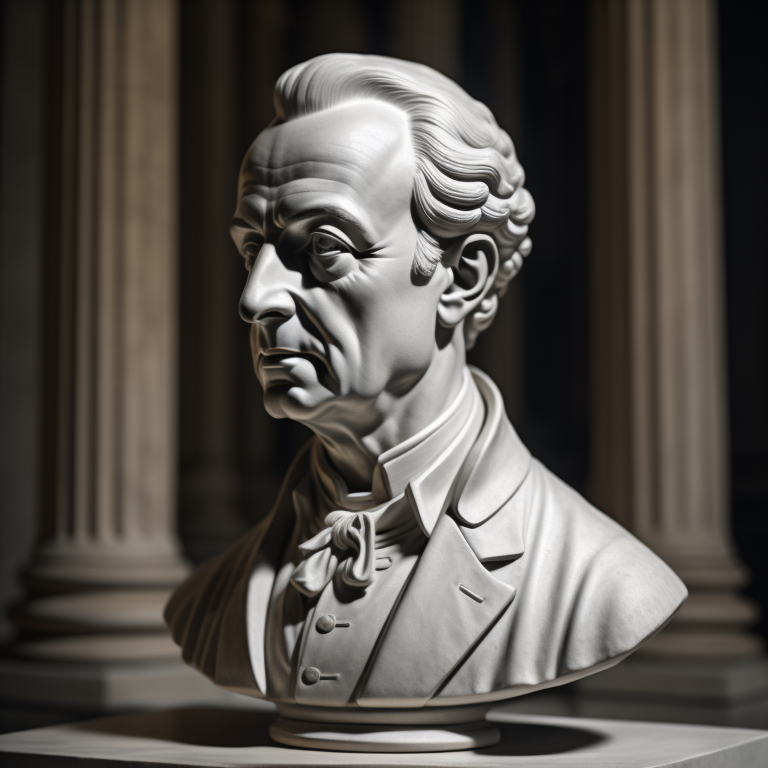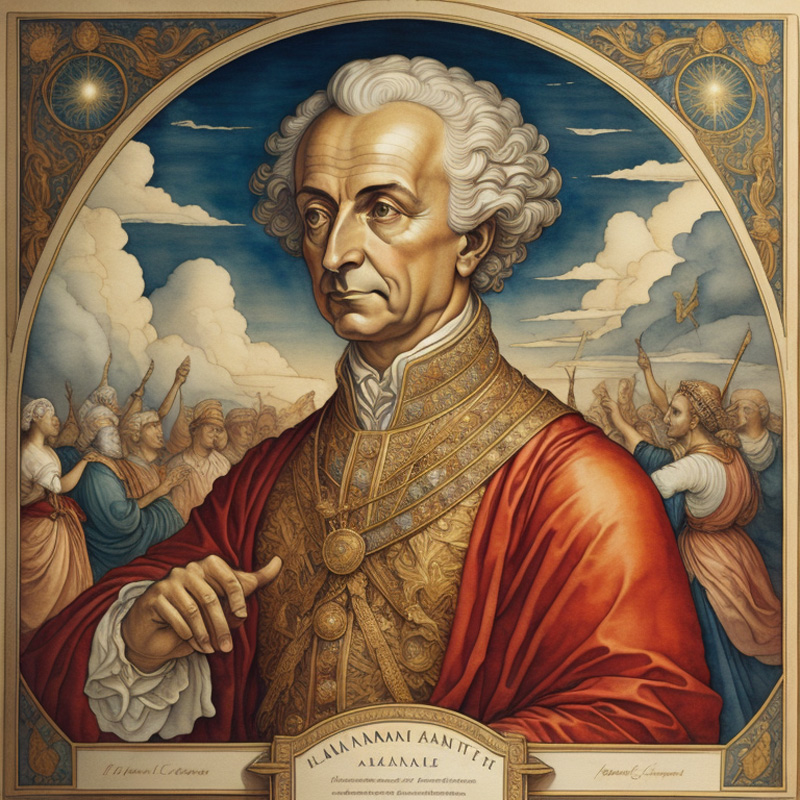
Immanuel Kant
Immanuel Kant: Exploring his Philosophy
Immanuel Kant (1724-1804)
He was a German philosopher influential in the Enlightenment and modern philosophy. He is known for his work “Critique of Pure Reason”, where he explored the limits of human knowledge and formulated the theory of knowledge based on mental categories. His ethical philosophy, centered on the categorical imperative, emphasized morality based on duty and the inherent dignity of people.
Main philosophical ideas:
- Human reason has two types of knowledge: a priori knowledge, which does not depend on experience, and a posteriori knowledge, which does depend on experience.
- A priori knowledge is possible because the human mind has a priori forms, which are mental structures that allow us to organize and make sense of experience.
- Ethics is based on the categorical imperative, which is a moral principle that tells us that we must act in a way that our maxim can be universalized.
His philosophy in one sentence:
Human reason is limited, but it can achieve a priori knowledge and morality through the categorical imperative.
Explanation for a child:
Imagine that you have a box with many toys. You don’t know what’s inside the box, but you know there’s something inside. This is an example of a priori knowledge. You don’t need to open the box to know that there is something inside. Now, imagine that you open the box and see that there is a toy car. This is an example of a posteriori knowledge. You needed to open the box to know what was inside.
Explanation for an adult:
Human reason is limited because it cannot know things as they are in themselves. You can only know things through experience. However, human reason can achieve a priori knowledge, which is knowledge that does not depend on experience. This knowledge is possible thanks to a priori forms, which are mental structures that allow us to organize and give meaning to experience. Ethics is based on the categorical imperative, which is a moral principle that tells us that we must act in a way that our maxim can be universalized. This means that we must act in such a way that our action can be the basis of a universal law.
The positive part of Kant’s philosophy
Kant’s philosophy has many positive things. For example, his theory of knowledge allows us to understand how human reason can achieve a priori knowledge, which is knowledge that does not depend on experience. This is important because it allows us to have a solid foundation for science and morality. His theory of ethics is also very important. The categorical imperative tells us that we must act in such a way that our maxim can be universalized. This means that we must act in such a way that our action can be the basis of a universal law. This helps us make correct moral decisions, even in difficult situations.
The negative part of Kant’s philosophy
Kant’s philosophy also has some negative things. For example, his theory of knowledge may seem too abstract to some people. Furthermore, his theory of ethics may seem too idealistic, since it is not always possible to act in a way that our maxim can be universalized.
A real life problem
A real-life problem that can be solved with Kant’s philosophy is the problem of choice. Often, we find ourselves in situations where we have to make a decision between two options, and we don’t know which is best. In these cases, we can use the categorical imperative to help us make a decision. For example, let’s imagine that we have to decide between two jobs. A job is rather boring, but it pays very well. The other job is more challenging, but is less well paid. Using the categorical imperative, we could say that we should take the job that allows us to develop the most as people, even if it is the least well-paid job.
The solution to the problem using Kant’s philosophy is to act in such a way that our maxim can be universalized. In the case of the work example, this means that we should take work that allows us to develop more as people, since this is something that all human beings should do.
The opposite philosophy to Kant’s: utilitarianism.
Utilitarianism is a moral philosophy that holds that the morally correct action is that which produces the greatest amount of happiness for the greatest number of people. This means that actions must be evaluated based on their consequences, and not their motives.
Utilitarianism is opposed to Kant’s philosophy in several ways. First, utilitarianism is based on hedonism, which is the belief that pleasure is the highest good. Kant, on the other hand, believes that reason is the highest good.
Secondly, utilitarianism believes that actions should be evaluated based on their consequences, while Kant believes that actions should be evaluated based on their motives.
Third, utilitarianism is a relativistic philosophy, which means that moral actions can vary depending on circumstances. Kant, on the other hand, believes that there are absolute moral principles.
Despite these differences, utilitarianism also has some positive things. For example, utilitarianism is a very pragmatic philosophy, which focuses on the reality of the world. Furthermore, utilitarianism is a very inclusive philosophy, which considers that all people have the same moral value.
However, utilitarianism also has some negative things. For example, utilitarianism can be very cold and calculating, as it only focuses on the consequences of actions. Furthermore, utilitarianism can be very permissive, as it can justify actions that are morally dubious if they produce a large benefit for the majority of people.
The differences between Kantianism and utilitarianism:
Kantianism:
Based on reason Focuses on motives for actions Moral principles are absolute
Utilitarianism:
Based on hedonism Focuses on the consequences of actions Moral principles are relative.

Sources
Books:
- “Crítica de la razón pura” – En esta obra principal, Immanuel Kant explora la naturaleza del conocimiento humano, examinando los límites y posibilidades de la razón y la experiencia.
- “Fundamentación de la metafísica de las costumbres” – En este libro, Kant desarrolla su ética basada en el imperativo categórico, abordando cuestiones de moralidad, deber y la dignidad inherente de las personas.
- “Crítica de la razón práctica” – Kant profundiza en su teoría ética en este trabajo, examinando la relación entre la razón práctica y la moralidad, y planteando conceptos como la autonomía y la voluntad.
Websites:






0 comments